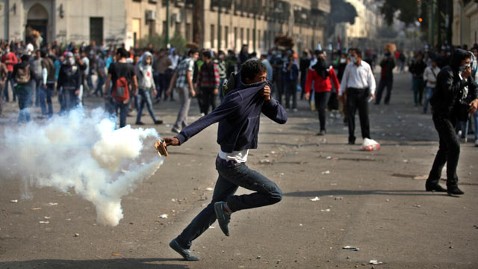Egyptians Protest President Morsi's Power Grab

Khalil Hamra/AP Photo
CAIRO - Waves of protesters poured into Cairo's Tahrir Square today to protest the far-reaching constitutional declaration made by President Mohammed Morsi last week that has essentially granted him unchecked power.
Click here for images of the demonstrations in Tahrir Square.
The new declaration frees Morsi from judicial oversight and with no parliament currently in place, many said longtime dictator Hosni Mubarak had simply been substituted with another.
"This is the first step for tyranny, he's trying to put all the power in his hands and this is against the constitution and the law," said Hassan Gamal, a professor of orthopaedic surgery. "No exceptions for anybody. Mubarak was tyrant because of the exceptions. We're not going to tolerate any exceptions anymore."
Liberal groups had called for the mass protest against Morsi, many of which have long complained of Islamists' strength in post-Mubarak Egypt, led by Morsi and the Muslim Brotherhood. Protesters today said they were afraid of the constitution being written by an Islamist-dominated constitutional assembly, which will be put to a referendum once finished.
"The Muslim Brotherhood, they say something and then do the opposite," said English teacher Nadine Mustafa. "We are in the 21st century, we want democracy, we don't want a pharaoh ruining the country. This is ridiculous."
Morsi's office published the seven-article declaration on Thursday, the second of which states that Morsi's laws and decrees "are final and binding and cannot be appealed by any way or to any entity" until the constitution is approved and a parliament elected.
Violence immediately broke out with clashes between Morsi opponents, supporters and police leading to more than 500 injuries and at least three deaths. To prevent more violence, the Muslim Brotherhood on Monday night cancelled their own rallies planned for today, though supporters did turn out in Alexandria.
"He's a president that was elected to office with no constitution, no parliament and no defined powers in the state. It's an exceptional circumstance," argued Muslim Brotherhood senior adviser Jihad Haddad, who accused Mubarak-appointed judges of blocking Morsi's attempts to reform the country's institutions.
Morsi's office insisted that the powers are only temporary. Haddad said the declaration will only be valid until a draft of the constitution is submitted.
"[Morsi] tried to do this through the only available avenue and choice," Haddad said. "It does terrify [Morsi opponents] because the only thing they can rely on is trust and that trust was given to us during the presidential elections."